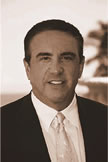|
 Home:
PCU3|2002: Editor's
Note
Home:
PCU3|2002: Editor's
Note
 |
Editor’s Note |
|
| Visiting Professors
|
Most of the research leaders interviewed for this series spend
a day at our conference center at the University of Miami. These
visits include a guest lecture and hours of intensive query by the
Prostate Cancer Update team of clinicians. The sessions are very
much a give and take. Our renowned guests share with us their unique
perspectives and expertise, while we impart our experiences in cancer
education, and our sincere interest in making an important impact
on patient care by functioning as an interface to doctors caring
for prostate cancer patients and their families. We usually interview
these visiting professors for the audio portion of our program at
the end of this long day. Sometimes the trust that we engender has
interesting consequences, as these leaders often not only discuss
clinical research data and trials but also more personal perspectives
on what this all means to patient care.
For example in this issue, oncologist Mary-Ellen Taplin —
in addition to discussing management of patients with rising PSAs
— shares her personal experiences as the wife of a patient
with a brain tumor. Dr Taplin notes that she and her husband visited
four major medical centers and received four different opinions
on optimal management. A recurring theme in prostate cancer is the
lack of clear-cut, evidence-based standards of care for many situations,
and Dr Taplin eloquently elaborates on the feelings of patients
and families when confronted with this type of dilemma.
Every physician understands the challenge of empathizing with
a person with a life-threatening disease, and yet it is interesting
that in spite of our best efforts, it often takes a real life event
to truly comprehend what our patients think and feel. In the first
issue of this series, urologist, Dr Paul Schellhammer, shared his
experience as a prostate cancer patient and noted how different
his perspective is now when he sees patients in his clinic. When
Dr Schellhammer first arrived at our center, we were unaware of
his own personal history of the disease, and we were truly moved
when he unhesitatingly agreed to share it with a national audience
of physicians.
Recently, our team hosted another group of “visiting professors”
— members of a local Man-to-Man prostate cancer support group
and their spouses. These courageous men and women agreed to participate
in video interviews, which will be utilized to stimulate discussion
at our first “Prostate Cancer Town Meeting” being held
in Hollywood, Florida, on September 22, 2002. In future issues of
this audio series, we will share with you the deliberations of this
unique workshop, which is seeking to have patients, families and
physicians develop ideas and suggestions for new initiatives in
patient education and support. The following, is an excerpt of one
of the premeeting video interviews.
— Neil Love, MD
A candid account of the impact of prostate
cancer:
A 52-year-old man’s experience
Being diagnosed with prostate cancer is earth-shattering
— your life changes in an instant. I was a basket case
for six months. It was a very difficult experience to go through.
As a person in his fifties, I cannot even conceive of my own
mortality. It was unbelievably shocking, and I was just devastated.
My urologist is a real "people person." He related
to me as a human being rather than as a statistic. I wanted
to know every detail about surgery before I went in, and he
spent two hours walking me through it with graphs and charts
and discussions about what would happen.
I felt like I had a partner who was going to fight along
with me. I was very pleased with him. But, the house officers
who I worked with didn’t have a clue. They were amazingly
insensitive. They didn't understand the impact of their words.
One thing for which I was not fully prepared was the incontinence
afterward. I have never had a catheter, and 12 days of that
was just horrible. Afterwards, I was relieved for about 10
minutes, until I found that I had to wear a diaper. It took
almost three months to get out of diapers, and I was absolutely
petrified that it was going to last forever.
Hormone therapy set me back a little bit in terms of energy
level and the ability to maintain a true lifestyle. My libido
was completely absent, and I gained a lot of weight. I wish
someone had warned me to take some proactive measures to avoid
so much weight gain.
The entire experience has been an emotional roller coaster.
I don’t know if it was the hormone therapy or the stress
after the diagnosis, but I was crying all the time, and anything
set me off, even a sad song. I did things that were not typical
for me, I wanted to cuddle all the time. I never used to do
that. I wanted to hold hands sitting on the couch watching
TV with my wife, with whom I’ve been married for 24
years.
I have a huge support system, which has been critical in
adapting to this. My wife has always been less active in our
relationship. I was always the one who took charge of everything.
But she suddenly got this incredible energy and took charge
of the whole thing, and it kind of flipped the relationship.
I was helpless for the first time.
So, with her taking charge and people in my network of family
and friends providing support, it made a big difference. I
had a lot of input and support. I also found other men who
had prostate cancer with whom to talk, which was very comforting.
I know that with a Gleason 8 tumor, there is the potential
that I am going to have a recurrence, but from what I can
see, maybe something else will get me first. |
|
|